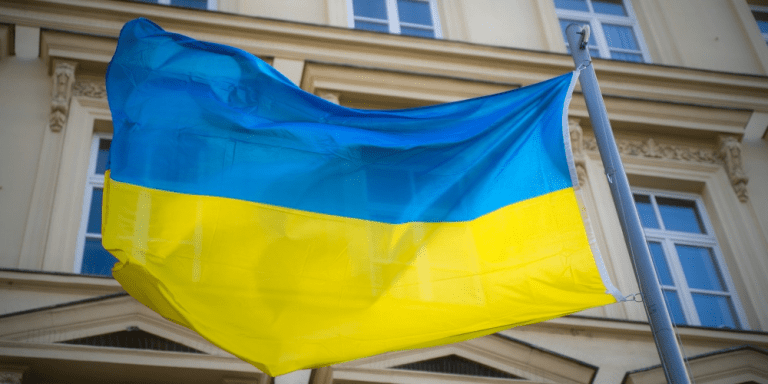Amnesty International has criticised the Czech Republic for hate speech and discrimination against Ukrainian refugees, continuing segregation of Roma children in education, and the export of weapons to Israel in its annual report on human rights in the country, released yesterday.
“Some 350,000 Ukrainian refugees remained in the country,” states the report. “Against a background of economic recession and rising inflation, Ukrainians were subjected to hate speech, harassment and hate crimes.” The report mentions the example of the violent assault of two female Ukrainian refugees in Plasy, west Bohemia, in August 2023, due to their nationality.
Ukrainian refugees faced obstacles to integration, including language barriers in schools, the report says. Although the employment rate among Ukrainian refugees was 64%, this was mostly in low-paid and low-skilled jobs.
The report says that very little has been done to concretely address the continuing segregation of Roma children at school. The Czech branch of Amnesty International noted that measures to improve the situation were introduced by the Education Ministry earlier this year.
Sexual minorities have also not seen their rights improve, the report says. Czech lawmakers rejected an amendment on marriage for all couples last year. “Sterilisation was still required by law for transgender people seeking legal gender recognition, despite a 2017 ruling by the European Court of Human Rights that this was in breach of human rights,” it added.
The Czech Penal Code still failed to recognise violence directed at people due to their sexual orientation or gender identity as a hate crime.
The report is also critical of the country’s outdated law on access to abortion, saying many medical facilities refused to provide abortions to non-EU citizens due to incorrect claims by the Czech Medical Chamber.
Amnesty also calls the Czech exports of arms to Israel, Saudi Arabia and the United Arab Emirates irresponsible, due to the risk that they could be used to commit serious violations of human rights and international humanitarian law.
While the Czech government is committed to carbon neutrality by 2050, the country has not yet adopted any law with specific climate targets, the report says.
The Amnesty International report assesses the state of human rights in more than 150 countries and regions, devoting a page and a half to Czechia in the nearly 420-page document.
In response to the report, Government Human Rights Commissioner Klara Simackova Laurencikova told CTK that the Czech Republic is aware of Amnesty International’s criticism of hate speech against Ukrainian refugees and is trying to address the problem.
Simackova Laurencikova said she has set up an expert team at the Government Office that is working on proposals and possible measures to be taken concerning hate violence. She said the planned steps concern prevention, legislation, education and awareness.
In Iustitia head Klara Kalibova said the Czech Criminal Code does not protect people with different orientation and identities or with disabilities from prejudicial violence, and the legislation must be amended to make the penalties more severe.
Government spokeswoman Lucie Jesatkova told CTK that the Education Ministry has introduced measures on the issue of ethnic segregation in education that it plans to implement in the next two years. For example, the system of financing regional education will be adjusted and methodological, personnel and financial support for schools will be set according to the proportion of pupils with social disadvantages, she said.
According to an analysis by In Iustitia, there has been an uptick of anti-Ukrainian and anti-Russian incidents in the Czech Republic since the Russian invasion of Ukraine. Last year, they accounted for 22% of cases of prejudiced violence recorded by the NGO. In the years before the war, it was at most 5%. In 2022, there were 16 anti-Ukrainian and 14 anti-Russian incidents. In 2023, there were 27 attacks against Ukrainian nationals and none against Russians.
The authors of the analysis said the results do not represent the full set of all cases, but only a sample of them. They noted that prejudicial incidents are often not reported to the police. According to In Iustitia, the number reflects the opposition of a part of society to helping refugees as well as the influence of fake news in support of Russia.
Simackova Laurencikova said it is positive that more than 120,000 refugees from Ukraine with temporary protection are working in the Czech Republic. However, she considers it problematic that most of them are doing less skilled work and their education and experience are not being used. There is therefore a need to strengthen Czech language teaching, she added.
Jesatkova said that since the beginning of the Russian invasion of Ukraine, Prague has adopted a clear strategy of providing the necessary assistance and support to people seeking refuge in the Czech Republic. This has played an important role in the process of successful adaptation of Ukrainian refugees into society and their legal work activity, she added.
Simackova Laurencikova said previously that the best step towards full equality for LGBT citizens in the country would be to accept marriage for all. She described the recently adopted amendment adding some rights as just a step in the right direction. Under the proposals, it would also no longer be necessary to undergo castration to officially change sex.







